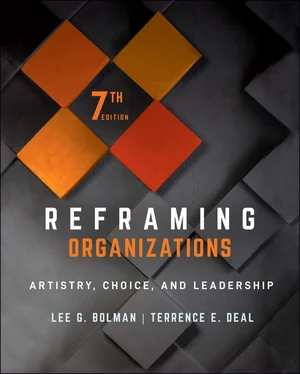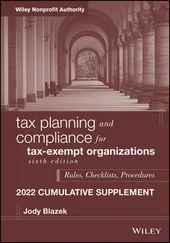Lee G. Bolman
Brookline, Massachusetts
Terrence E. Deal
San Luis Obispo, California
February 2021
We noted in our first edition, “Book writing often feels like a lonely process, even when an odd couple is doing the writing.” This odd couple keeps getting older (ancient, to be more precise) and, some would say, even grumpier. It seems like only yesterday that we were young, aspiring new authors full of vim and vigor. But that was 40 years ago. To our amazement, we're still at it, and, even more remarkable, have remained close friends.
The best thing about teaching and book‐writing is that you learn so much from your readers and students, and we have been blessed to have so many of both. They have come from a number of institutions: Stanford, Harvard, Vanderbilt, the University of Missouri–Kansas City, the University of La Verne, and the University of Southern California, and have given us invaluable criticism, challenge, and support over the years. (Lee gives a special shout‐out to everyone in his Fall, 2020, course at Harvard Extension, who kept generating ideas and finding great stuff to read. Particular thanks to Lisa Chisholm, Monica Eaton, Thomas Gibson, Kyle Kenney, Sharon Loh, Marissa Mann, Kafi Rouse, Jay Sivasailam, Deise Uema, Jared Weikum, and Vincent Zhou.)
We're also grateful to the many readers who have responded to our open invitation to write and ask questions or share comments, including readers from many other countries, including Brazil, Canada, China, Finland, France, Italy, Japan, Norway, Sweden, Switzerland, the United Kingdom, and Venezuela. They have helped us write a better book. (The invitation is still open—our contact information is in “The Authors.”) We wish we could personally thank all of the leaders and managers who helped us learn in seminars, workshops, and consultations. Their knowledge and wisdom are the foundation and touchstone for our work. The list is long and varied.
We wish we could thank all the colleagues and readers who have offered valuable comments and suggestions, but the list is expanding while our memories are shrinking. Bob Marx, of the University of Massachusetts, deserves special mention as a charter member of the frames family. Bob's interest in the frames, creativity in developing teaching designs, and eye for video material have aided our thinking and teaching immensely. Sharon Conley, of the University of California, Santa Barbara, is always a source of extremely insightful feedback. Her interest in leadership among principals and teachers keeps us grounded in the world of schools. Conversations with Dick Scott and John Meyer of Stanford University have helped us explore the nuances of institutional theory. Susan Griggs, of the University of Denver, and Renee Powell offered provocative critiques of our handling of issues related to gender and leadership. Elena Granell de Aldaz, of the Institute for Advanced Study of Management in Caracas, collaborated with us on developing a Spanish‐language adaptation of Reframing Organizations as well as on a more recent project that studied frame orientations among managers in Venezuela. We are proud to consider her a valued colleague and wonderful friend. Azarm Ghareman, a clinical psychologist, deepened our understanding of Carl Jung's view of the important role symbols play in human experience. Captain Gary Deal, USN, at the Eisenhower School, National Defense Institute, taught leadership and the frames to senior naval officers. He and wife Leslie are now working at Trader Joe’s. Dr. Peter Minich, a transplant surgeon, now brings the world of leadership to physicians. Major Kevin Reed, of the United States Air Force, and Jan and Ron Haynes, of FzioMed, all provided valuable case material. Angela Schmiede of Menlo College broadened our views of ways the frames can contribute to undergraduate education. Colette Joyce helped with page proofs.
A number of friends and colleagues at the Organizational Behavior Teaching Conference have given us many helpful ideas and suggestions. We apologize for any omissions, but we want to thank Anke Arnaud, Carole K. Barnett, Max Elden, Kent Fairfield, Cindi Fukami, Olivier Hermanus, Jim Hodge, Earlene Holland, Scott Johnson, Mark Kriger, Hyoungbae Lee, Larry Levine, Mark Maier, Magid Mazen, Thomas P. Nydegger, Dave O'Connell, Lynda St. Clair, Mabel Tinjacá, Susan Twombly, and Pat Villeneuve. We can only wish we had succeeded in implementing all the wonderful ideas we received from these and other colleagues.
Lee is grateful to all his Bloch School colleagues, and particularly to Nancy Day, Pam Dobies, Dave Donnelly, Doranne Hudson, Jae Jung, Tusha Kimber, Sandra Kruse‐Smith, Rong Ma, Brent Never, Roger Pick, Stephen Pruitt, Laura Rees, David Renz, Marilyn Taylor, and Bob Waris. Terry's colleagues, Carl Cohn, Stu Gothold, and Gib Hentschke, of the University of Southern California, have offered both intellectual stimulation and moral support. Terry's (2013) team‐teaching venture with President Devorah Lieberman and Professor Jack Meek of the University of La Verne showed what's possible when conventional boundaries are trespassed in a class of aspiring undergraduate leaders.
This experience led to the founding of the Terrence E. Deal Leadership Institute. The Institute focuses on the role of fiction, music, art, metaphor, theater and drama, and other nonrational aspects of leadership and organizations. The board for the Institute includes Dr. Shannon Capaldi, Executive Director Lee Bolman, Lee Brockman, Carl Cohn, Sharon Conley, Myra Garcia, Stu Gothold, Bill Hawkins, Wendy Lau, Doan Thi Nam‐Hau, Alma Martinez, Jack Meek, and the late Warren Bennis.
Others to whom our debt is particularly clear are John Aasted, Homa Aminmadani, the late Chris Argyris, Sam Bacharach, Cliff Baden, Margaret Benefiel, Estella Bensimon, Bud Bilanich, Bob Birnbaum, Barbara Bunker, Tom Burks, Ellen Castro, Carlos Cortés, Linton Deck, Dave Fuller, Ellen Harris, Jim Honan, Jim Hynes, Tom Johnson, Bob Kegan, James March, Grady McGonagill, Judy McLaughlin, John Meyer, Kevin Nichols, Harrison Owen, Donna Redman, Peggy Redman, Michael Sales, Karl Weick, Julie Wheeler, Roy Williams, and Joe Zolner. Thanks as always to Dave Brown, Tim Hall, Todd Jick, Bill Kahn, Phil Mirvis, and Barry Oshry of the Group previously known as the Brookline Circle, now in its fifth decade of searching for joy and meaning in lives devoted to the study of organizations, even with its members mostly retired and spread across five different states.
Outside the United States, we are grateful to Poul Erik Mouritzen in Denmark; Rolf Kaelin, Cüno Pumpin, and Peter Weisman in Switzerland; Ilpo Linko in Finland; Tom Case in Brazil; Einar Plyhn and Haakon Gran in Norway; Peter Normark and Dag Bjorkegren in Sweden; Ching‐Shiun Chung in Taiwan; Helen Gluzdakova and Anastasia Vitkovskaya in Russia; and H.R.H. Prince Philipp von und zu Lichtenstein.
Four professional winemakers, the late Romeo “Meo” Zuech of Piedra Creek Winery, Brett Escalera of Consilience, and Tre Anelli and Bob Shiebelhut of Tolosa, offer advice that applies to leadership as well as wine making. Meo reminds us, “Never over‐manage your grapes,” and Brett prefaces answers to all questions with “It all depends.” On the East Coast, members of two neighborhood groups, Feet First and the Salisbury Road Book Club, have helped to maintain sanity and spirit even when the pandemic blocked our traditional sharing of food and drink
We're delighted to be well into the fourth decade of our partnership with Jossey‐Bass and Wiley. We're grateful to the many friends who have helped us over the years, including Bill Henry, Steve Piersanti, Lynn Luckow, Bill Hicks, Debra Hunter, Cedric Crocker, Byron Schneider, Kathe Sweeney, and many others. In recent years, Jeanenne Ray has been a wonderful editor and friend.
Читать дальше

![Lee Jungmin - Хвала Орку 1-128 [некоммерческий перевод с корейского]](/books/33159/lee-jungmin-hvala-orku-1-thumb.webp)










